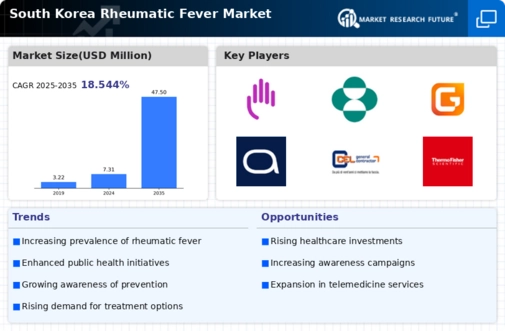The South Korea Rheumatic Fever Market is characterized by a growing emphasis on innovative treatments and preventative measures due to the increasing prevalence of rheumatic fever in the region. Competitive insights reveal a landscape where pharmaceutical companies focus on advanced research and development aimed at combating the lasting effects of rheumatic fever, particularly in pediatric populations. This environment fosters collaboration between various stakeholders, including government bodies, healthcare providers, and researchers, aimed at improving patient outcomes. Additionally, the regulatory framework in South Korea plays a crucial role in shaping market dynamics, encouraging companies to enhance their product offerings.
Alongside, the strategic investment in public health initiatives designed to raise awareness about rheumatic fever and its implications significantly supports market growth. Amgen has established a notable presence in the South Korea Rheumatic Fever Market through its commitment to innovative biopharmaceuticals. The company's strengths lie in its robust R&D capabilities, allowing it to develop targeted therapies that address the specific needs of patients with rheumatic fever. This focus on innovation is complemented by strategic partnerships with local healthcare entities, enhancing its market reach and influence.
Moreover, Amgen's investment in clinical trials tailored to the South Korean population demonstrates its dedication to understanding local treatment needs and ensuring effective therapy options are available. This has positioned Amgen as a key player in the market, contributing to its competitive edge and long-term sustainability in overcoming barriers associated with rheumatic diseases.BristolMyers Squibb has also made significant strides within the South Korea Rheumatic Fever Market, with an emphasis on comprehensive treatment options that encompass both medications and patient support services.
The company boasts a range of key products targeted at mitigating the effects of rheumatic fever, which strengthens its market presence.
BristolMyers Squibb’s strengths include its extensive experience in immunology and its commitment to addressing unmet medical needs through innovative solutions. The company has pursued strategic mergers and acquisitions that enhance its portfolio and capabilities in the market, allowing it to deliver more effective therapies. Furthermore, their collaborations with local healthcare institutions facilitate the development of tailored approaches that address the specific concerns of Korean patients, further solidifying their standing in the competitive landscape of the South Korea Rheumatic Fever Market.
























